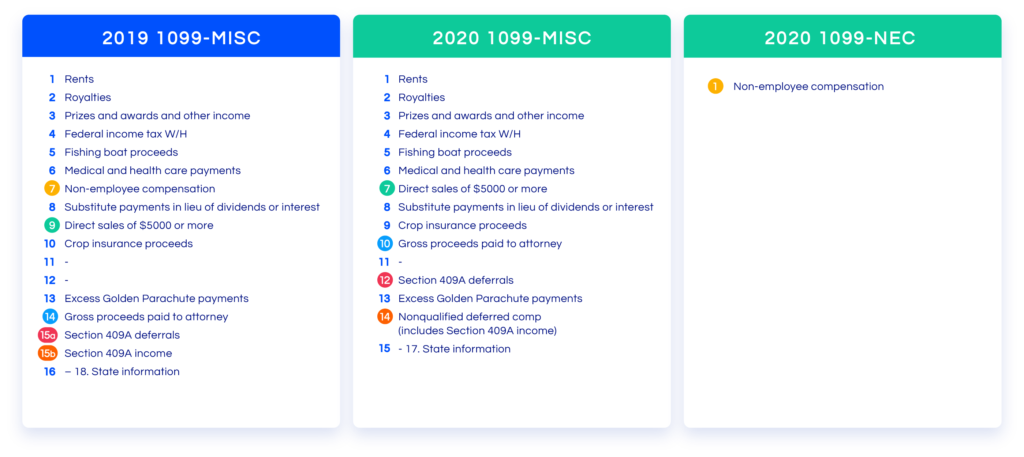Prior to 2020, if your firm paid freelancers, contractors, or other non-employees $600 or more during the year, a 1099-MISC would be issued and sent to the payee.
In 2020, the IRS released form 1099-NEC, a new form that will change the way 1099-MISC reporting has been handled for years.
This 1099-NEC was added specifically for reporting non-employee compensation. This will include payments to individuals who are not employees, as well as payments for services to partnerships, estates, or, in some cases, corporations (such as attorneys and law firms).
Yes, the 1099-MISC is still being used, however, it has been redesigned, so it will be especially important to pay close attention to how payments are being reported in early 2021.
Let's take a look!
New Changes
To start, let's talk about what exactly has changed. To help give you a better visual, below is a chart indicating what exactly has changed between the 2019 form and the 2020 forms:

Any payments in 2020 to attorneys and/or law firms for services rendered should now be entered in Line Item or Box 1 of form 1099-NEC. Gross proceeds, such as settlements paid to attorneys/law firms, should now be recorded in Box 10 of 1099-MISC.
It will be more important than ever to review all vendor settings to ensure that 1099 vendor payments are reported in the correct box and on the correct form in 2020.
Form 1099-MISC must be filed by March 1, 2021, if filed on paper, or by March 31, 2021, if filed electronically. But vendor record review should begin as soon as possible because the 2020 accelerated due date for filing form 1099-NEC with the IRS is on or before February 1, 2021, whether you're using paper or electronic filing procedures.
A best practice to prevent the beginning of the year scramble to obtain missing information from vendors is to require a current W-9 prior to issuing any payments to vendors. This will ensure that each vendor record is set up properly in the accounting system. Further, an updated W-9 should be requested at the beginning of each year, prior to issuing any additional payments, to confirm that the information contained in the vendor record is accurate from year to year.
If you're using a legal practice management software, records and data may look different, but in Centerbase, each vendor has its own record where settings specific to that vendor are located. This makes reviewing and editing the vendor’s 1099 settings a very simple process. Additionally, documents such as the current W-9s can be attached and notes can be entered on a vendor record, making verification of 1099 information quick and easy.
Remember that any credit or debit card payments to vendors should be excluded in what is reported to the IRS since each credit card company (payment settlement entity) reports payments via credit card to vendors on form 1099-K. If credit card payments were to be included in the amounts reported on 1099-MISC or 1099-NEC, it would result in the reporting of the vendor’s income to the IRS twice. This may ultimately result in the necessity of filing corrected 1099’s if requested by the vendor. Centerbase provides the ability to filter out credit card payments from the 1099 vendor report, eliminating the necessity of manually reviewing all vendor payments. This report can be downloaded and used to prepare 1099’s each year.
The Takeaway
Preparing for filing 1099’s is going to take some additional effort in early 2021, specifically as it relates to legal settlement accounting. With the filing deadline for form 1099-NEC only 31 days into the new year, getting started on vendor review as soon as possible will be essential.
Now that you are armed with the knowledge of the changes to 1099-MISC and what is to be reported on the new form 1099-NEC, you should be able to accurately conduct 1099 reporting for 2020.
For more detailed information regarding 1099-MISC and 1099-NEC reporting for 2020, check out the IRS instructions.